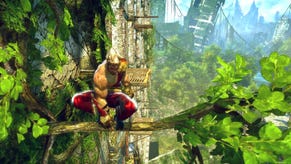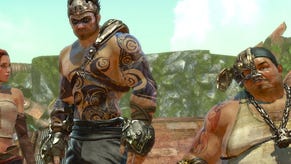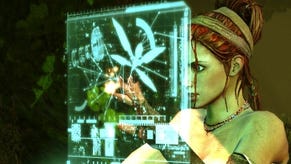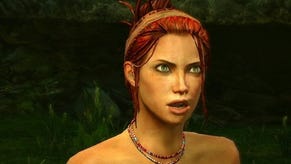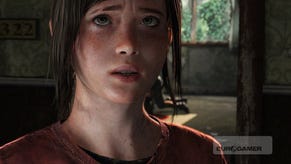Enslaved's Tameem Antoniades
"Just look at the music industry. Most music is utter, utter trash."
Ninja Theory's first game, Heavenly Sword, made headlines for a few reasons: it was PS3 exclusive, looked good, starred latex-lips Andy Serkis and ever so nearly smashed the proverbial ball out of the park. Ninja Theory's next game, Enslaved, isn't a PS3 exclusive but multiplatform, heading to Xbox 360 as well. Enslaved does, however, have Andy Serkis, plus the temperamental talent of big-bucks novelist Alex Garland, best known for The Beach - book and screenplay.
Tameem Antoniades, co-founder of Ninja Theory, spoke at Develop Brighton about the gargantuan effect Garland had had on Enslaved; not only has he co-written the game, but he's now credited as a designer. With a game that's shaping up to the multi-award winning Uncharted 2, a hotbed of hot-headed Hollywood talent, Antoniades can be forgiven for looking a little fraught. But we peppered him with questions nonetheless.
[Laughs] Um, he's intimidating because he knows his stuff. And when he knows that something is wrong our agreement was that we're allowed to say. If it looks like bulls*** then say "bulls***". So, yeah, it can be intimidating at the beginning, but his attitude was to be as open, honest, collaborative and non-judgemental as possible, so you're totally comfortably in that environment. So, yeah, it can be intimidating at the start.
Yes it does raise the stakes because you don't want to do a bad job. When you've got talent like that on board you want the game to live up to their expertise. And you go into every project setting a level of ambition, your goal that you're trying to hit. And you've got to do everything in your power to hit those goals. It's more of a case of getting the best people as you can to try and get that - to nail that. The worst is if you fall short. My attitude is that now I am less likely to fall short.
No, I wouldn't do that. Actually, Heavenly Sword was really tough for a whole slew of reasons that weren't to do with creative - they were to do with technology, the whole PS3 announcement and things around that. This was comfortable development where the tough part was on the creative side, and that's a good place to be.
Yes, it would have been. He's got something that as game developers we don't have, which is this keen visual eye for storytelling. So undoubtedly, yes. Not only does that kind of approach make the story hold up, it actually improves gameplay. If you can hit the mark, the game stops being a collection of animations, gameplay moments and story moments, and it can transcend and become this experience that you just immerse yourself in. And that's the objective. Honestly I don't know if we're going to hit that - you never know when you're developing. But that's what we're trying our best to do.
Yeah, it's absolutely true.
Yeah.
I'm sure he wouldn't appreciate me telling how much - what the deal terms were. But I'd say that his primary motivation on this project was he wants to work on a videogame. He could certainly be earning a lot more money working in films. For him it was a curiosity: something he wanted to get out of his system.


